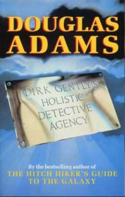You know those polished wooden egg puzzles that people buy for you, the kind that are beautiful when they’re an egg but that fall to part into shards that seem impossible for mortals to reassemble? Then maybe after a lot of trying suddenly all these impossible three dimensional jigsaw pieces suddenly slot together and you have a lovely fragile egg again? Douglas Adams’s Dirk Gently’s Holistic Detective Agency always reminds me of one of those.
I didn’t read it for ages. It wasn’t that I didn’t like
The Hitchhiker’s Guide to the Galaxy
, it was just that I thought the plot had rather fallen apart in the later books. Indeed, the “throw in everything including the kitchen sink and St Anselm’s ontological proof of the existence of God” style of the Hitchhiker books had lent the series high initial energy but did not lead to continuous plot, or even necessarily making sense. They were inventive and amusing, but he seemed to be juggling too many balls and letting a lot of them drop. I wasn’t in a hurry for more Douglas Adams in 1987. I didn’t get around to picking Dirk Gently up until Emmet insisted on lending it to me in the mid-nineties.
[more below the fold…]
I read it for the first time on the train, the long six hour (if nothing went wrong) train journey between Cambridge and Lancaster. I read it with a five year old Sasha reading Tintin and Asterix comic books beside me and asking (admirably rarely) if we were nearly at Crewe yet and (regrettably frequently) to explain a pun to him. (There’s nothing like discovering how much sheer context and world knowledge a pun requires like explaining the puns in Asterix to a five year old.) Despite the inauspicious circumstances, Dirk Gently kept making me giggle, whereupon I resolutely refused to read the funny bits aloud. “You’ll want to read this yourself one day,” I said, and time proved me right. When he read it, aged about twelve, he loved it.
I’m going to give you one example, the one that had me laughing so helplessly on the train that people were turning around to look and poor five year old Sasha was embarrassed to be seen with me. Dirk Gently has a holistic detective agency of the kind that you’d expect to find in a Sheckley novel. Earlier, his secretary has torn out the middle of the dictionary to fit it into a drawer.
“Luckily,” he said, “You have come to exactly the right place with your interesting problem, for there is no such word as impossible in my dictionary. In fact,” he added, brandishing the abused book, “Everything between herring and marmalade appears to be missing.”
It’s the timing that’s so beautiful, and the unlikeliness of the words.
What brings me back to it isn’t the funny bits, though some of them remain funny long after they’ve stopped being surprising. (Dirk’s later offered a herring, and says there’s no such word in his dictionary… and all of this is build up and foreshadowing for something that is in our world but not in theirs, yet.) What’s beautiful about it is the way the plot looks as if it’s bumbling along tossing elements into the blender and making a big messy stew, just like Hitchhiker, and then suddenly it gives a glorp and assembles itself into a perfect precise layer cake. In retrospect, every element of the book makes perfect glorious sense and needs to be there. It all fits together, from the way the sofa won’t go either up or down the stairs to the appalling dinner conversation about music on Radio Three. Things that look like jokes and asides are actually all set up. Every piece fits with every other piece like a perfect machine. It’s almost impossible to summarise or synopsise because of this. If you wanted to tell someone about it you’d have to say “Well, there’s this time machine. And the person from Porlock. And ghosts. And Bach was written by aliens. And it’s SF and very funny and it all totally makes sense eventually.” I admire it no end.
There are very few other examples of books I re-read to glory in the way they’re put together. There’s Barry Hughart’s Bridge of Birds, and John James’s Not For All the Gold in Ireland and perhaps — another time travel story — Tim Powers’s The Anubis Gates.










